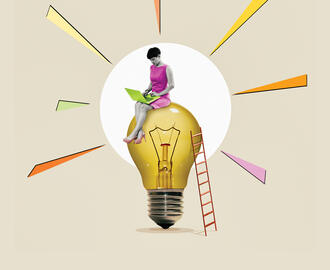Credit: The Boston Headshot
Ideas Made to Matter
Venture Capital
Here’s where Vinod Khosla is investing and sees room for disruption
By
As technology drove business in the 20th century, Vinod Khosla was one of its major engines. Khosla co-founded Sun Microsystems in the 1980s. He later founded venture capital firm Khosla Ventures, where he backs innovations in areas ranging from artificial intelligence and robotics to health care. He spoke at MIT Sloan on Sept. 19 as part of the General Georges Doriot Lecture Series.
In the talk, he urged students to realize that disruption and entrepreneurship can improve all aspects of society.
“Nothing is safe from disruption,” he said. As a result, we could “multiply resources, achieve food goals, reshape cities, cure disease,” and more.
Ultimately, he said, “Technology doesn’t rule: It serves. And we get to decide its goals.”
In the talk, Khosla forecasted several areas where he believes technology will transform society. Here are three highlights.
Health and medicine: “Symptom-based medicine will change,” he said. The traditional process of diagnosis between doctor and patient will give way to a data-driven model. Instead of a patient reporting problems to a physician — at which point a disease or illness has already taken hold — a patient will be tracked using data from thousands of biomarkers and AI imaging tools that can detect illness long before it manifests as symptoms. Meanwhile, medical advice will be available round-the-clock. One example is Ginger.io, the 24/7 digital therapist that uses on-demand, AI-based triage services to interact with patients. Khosla Ventures invested in 2012.
Housing and construction: Technology will transform how we maximize space and how quickly we create and design buildings. One example is Ori, which combines robotics and architecture to manipulate small urban spaces. A robotic system controlled by remote or app moves retractable furniture and walls, turning living rooms into bedrooms or common areas. Khosla Ventures invested in 2017. Meanwhile, MIT researchers have created a large mobile 3-D printer that can print the basic structure of a building in less than 24 hours.
Food and agriculture: Food companies are changing the way we exploit the environment. For instance, the Impossible Burger looks, tastes, and smells like a juicy, meaty burger — except it’s entirely plant-based, emitting 80 percent fewer greenhouse gases, using 75 percent less water, and reducing cruelty to animals, Khosla said. Instead, its meaty flavor comes from heme, a tiny molecule found in plants and animals. Impossible’s scientists extract it from plants and insert it into genetically engineered yeast to ferment and multiply, creating a meat-like product with less environmental impact. Khosla Ventures invested in Impossible Foods in 2011.
These changes only come from taking risks. Khosla implored the audience to ignore stringent rules and processes. Change isn’t propelled by organizational structure, he said.
“Major disruption is mostly non-institutional,” he said. “I cannot think of one major innovation that came from an institution.”
Instead, it springs from entrepreneurs with vision, as in Silicon Valley: “a culture of hubris, where they experiment, iterate, improve — and blunder into a vision,” he said. “Planning in innovation is a bad idea.”
In closing, Khosla provided the audience with his email address — “I check all my emails,” he said — in case they have good ideas, too.



